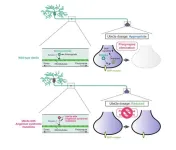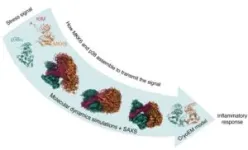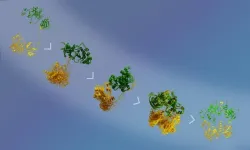(Press-News.org) Researchers from the University of Tokyo reveal how the presynaptic Ube3a E3 ligase, a causal factor in Angelman syndrome, eliminates neural chat. The study helps find a better drug target for the Angelman syndrome treatment.
Neurons chat through electrical signals, transmitting information via connection sites between neurons—the synapses. After birth, the number of synapses increases. During childhood, the brain starts to mature and removes many unnecessary synapses. But sometimes, the development of the nervous system goes awry, leading to developmental disorders.
Kotaro Furusawa, an Assistant professor and the first author of the study, says that their team is interested in understanding “how the brain matures functionally through genetic information and external experience.”
Furusawa and his team hoped to reveal the molecular mechanism involved in synaptic elimination during neural development and offer insights into developmental disorders such as Angelman syndrome.
Angelman syndrome is a rare genetic disorder that affects neuronal development and causes physical and intellectual disabilities. In patients with Angelman syndrome, a gene called Ube3a does not function well, which prevents synapse elimination during development. On the other hand, abnormally high Ube3a leads to precocious synapse elimination and causes autism spectrum disorders.
How the disruption of Ube3a in the presynaptic neurons (that send information to postsynaptic neurons) leads to synaptic defects has been unknown until now. “[It is due to] the technical difficulties in handling the neural circuits of the developing mammalian brain," Furusawa explains.
His team probed the sensory neurons of the common fruitfly, Drosophila melanogaster, and successfully identified the Ube3a and its inner workings. That helped them reveal its role in synapse elimination.
“It was challenging to identify the main factors involved in the synapse elimination,” adds Furusawa. “We resolved it by an exhaustive search through genetic screening.”
They discovered that Ube3a removes synapses by degrading presynaptic receptors called Bone Morphogenetic Protein (BMP) receptors, which are necessary for synapse formation. Disrupting this activity leads to an abnormal number of synapses. So, the treatments for Angelman syndrome should target BMP receptors.
This is the first study to show that the lack of presynaptic Ube3a E3 ligase disrupts synaptic pruning. The finding enabled the team to suggest a new mechanism by which genetic mutations and abnormal Ube3a dosage lead to impaired synaptic transmission and hinder brain maturation.
The findings appear in the latest issue of the journal Science.
###
Useful resources for journalists
Researcher website: http://www.bs.s.u-tokyo.ac.jp/~brain/en/
Angelman syndrome: https://angelmansyndromenews.com/what-is-angelman-syndrome/
School of Science, The University of Tokyo: https://www.s.u-tokyo.ac.jp/en/overview/charter.html
Journal article: Kotaro Furusawa, Kenichi Ishii, Masato Tsuji, Nagomi Tokumitsu, Eri Hasegawa, and Kazuo Emoto. 2023. Presynaptic Ube3a E3 ligase promotes synapse elimination through downregulation of BMP signaling. Science. doi: 10.1126/science.ade8978
END
How a molecule deletes neural chat might help treat Angelman syndrome
A molecule that eliminates neural synapses offers insights into rare genetic disorders such as Angelman syndrome and autism spectrum disorders
2023-09-14
ELSE PRESS RELEASES FROM THIS DATE:
In songbirds, complex vocal learning predicts problem-solving abilities and brain size
2023-09-14
Vocal learning complexity, or the ability to imitate sounds, is associated with better problem-solving abilities and larger brains in songbird species, according to a new study. Whether vocal learning complexity was linked with such cognitive phenotypes was previously unknown. The approach used in the study, to study a lineage of birds, serves as a model for testing similar patterns in other vocal learning species. Complex vocal learning – the ability to imitate heard sounds – is a crucial component of human spoken language and has been assumed to be associated with more advanced cognitive abilities. Outside of humans, it has ...
Governance reforms could strengthen the Sustainable Development Goal implementation
2023-09-14
In a Policy Forum, Frank Biermann and colleagues outline demanding – yet realistic – policy reforms to strengthen the governance and implementation of the United Nations’ (UN) ambitious Sustainable Development Goals (SDGs). In 2015, the UN General Assembly agreed on 17 SDGs with 169 targets intended to be achieved by 2030. However, recent research has shown that the political impact of these goals has been limited and has not yet succeeded in reorienting political systems, institutions, or societies ...
Switching off the cytokine storm
2023-09-14
Constant exposure of cells to stressing agents, such as pathogens, may disturb an organism’s normal functioning. To fight stress, cells have developed several coping mechanisms, including the inflammatory response.
While inflammation is necessary, too much of it can impair cell and organ function. This is the case with cytokine storms – inflammatory cascades during an infection that can spiral out of control and lead to severe disease and even death, as recently highlighted during the COVID-19 pandemic.
In a new paper published in Science, EMBL Grenoble and University ...
Specialised gut immune cells pinpointed that can limit progression of inflammatory bowel disease
2023-09-14
Researchers at the Francis Crick Institute, King’s College London and Guy’s and St Thomas’ NHS Foundation Trust have characterised a specialised type of immune cell, which plays a key role in protecting and repairing the cells in the healthy human gut.
These protective immune cells are depleted in inflammatory bowel disease (IBD), leaving patients vulnerable to disease progression and severe complications. The findings could lead to better clinical management and treatment options for people living ...
Researchers call for major reforms of the UN Sustainable Development Goals: SDG Summit a decisive moment
2023-09-14
On 18-19 September, the United Nations will convene a major summit to review the state of the Sustainable Development Goals (SDGs)—the 17 global goals that governments agreed upon in 2015 to guide action towards a prosperous and just future. With research showing that the SDGs have since then had little political impact, the UN Summit must pave the way for four major changes in how the SDGs are implemented and governed globally, argues an international group of experts in Science.
The article, based on research led by Utrecht University in the Netherlands, brought together a group of scholars with broad expertise in global sustainability governance. “Our ...
Researchers discover tissue-specific protection against protein aggregation
2023-09-14
Key points:
Protein aggregation in certain tissues is a hallmark of diseases such as neurodegeneration and occurs during ageing, but little is known about how protein quality control mechanisms acting to prevent toxic protein build-up vary on a tissue-by-tissue basis.
Dr Della David and her team have discovered a safety mechanism that acts to lower levels of protein aggregation in C. elegans pharyngeal muscles, but is not active in body-wall muscles.
This new mechanism was identified by comparing protein accumulation in different tissues in ageing nematode worms when ...
Genetically modified bacteria break down plastics in saltwater
2023-09-14
Researchers have genetically engineered a marine microorganism to break down plastic in salt water. Specifically, the modified organism can break down polyethylene terephthalate (PET), a plastic used in everything from water bottles to clothing that is a significant contributor to microplastic pollution in oceans.
“This is exciting because we need to address plastic pollution in marine environments,” says Nathan Crook, corresponding author of a paper on the work and an assistant professor of chemical and biomolecular engineering ...
Study explains why certain immunotherapies don’t always work as predicted
2023-09-14
CAMBRIDGE, MA -- This block is broken or missing. You may be missing content or you might need to enable the original module.
Cancer drugs known as checkpoint blockade inhibitors have proven effective for some cancer patients. These drugs work by taking the brakes off the body’s T cell response, stimulating those immune cells to destroy tumors.
Some studies have shown that these drugs work better in patients whose tumors have a very large number of mutated proteins, which scientists believe is because those proteins offer plentiful ...
Growth of large operators threatens existence of grassroots coworking spaces, study warns
2023-09-14
The growing number of large operators and developers opening coworking premises threatens to end the availability of grassroots community-oriented spaces designed to bring isolated workers together, a new study warns.
These coworking communities were originally set up to create serendipitous encounters, knowledge-sharing opportunities, and social capital. But the increasing numbers of big companies running flexible offices means they are less likely to offer services matching these aims.
Smaller operators see the incursion by large commercial real estate developers ...
Using topology, Brown researchers advance understanding of how cells organize themselves
2023-09-14
PROVIDENCE, R.I. [Brown University] — The fact that humans and other living organisms can develop and grow from a single cell relies on a process called embryonic development. For healthy tissue to form, cells in the embryo have to organize themselves in the right way in the right place at the right time. When this process doesn’t go right, it can result in birth defects, impaired tissue regeneration or cancer. All of which makes understanding how different cell types organize into a complex tissue ...
LAST 30 PRESS RELEASES:
ASU researchers to lead AAAS panel on water insecurity in the United States
ASU professor Anne Stone to present at AAAS Conference in Phoenix on ancient origins of modern disease
Proposals for exploring viruses and skin as the next experimental quantum frontiers share US$30,000 science award
ASU researchers showcase scalable tech solutions for older adults living alone with cognitive decline at AAAS 2026
Scientists identify smooth regional trends in fruit fly survival strategies
Antipathy toward snakes? Your parents likely talked you into that at an early age
Sylvester Cancer Tip Sheet for Feb. 2026
Online exposure to medical misinformation concentrated among older adults
Telehealth improves access to genetic services for adult survivors of childhood cancers
Outdated mortality benchmarks risk missing early signs of famine and delay recognizing mass starvation
Newly discovered bacterium converts carbon dioxide into chemicals using electricity
Flipping and reversing mini-proteins could improve disease treatment
Scientists reveal major hidden source of atmospheric nitrogen pollution in fragile lake basin
Biochar emerges as a powerful tool for soil carbon neutrality and climate mitigation
Tiny cell messengers show big promise for safer protein and gene delivery
AMS releases statement regarding the decision to rescind EPA’s 2009 Endangerment Finding
Parents’ alcohol and drug use influences their children’s consumption, research shows
Modular assembly of chiral nitrogen-bridged rings achieved by palladium-catalyzed diastereoselective and enantioselective cascade cyclization reactions
Promoting civic engagement
AMS Science Preview: Hurricane slowdown, school snow days
Deforestation in the Amazon raises the surface temperature by 3 °C during the dry season
Model more accurately maps the impact of frost on corn crops
How did humans develop sharp vision? Lab-grown retinas show likely answer
Sour grapes? Taste, experience of sour foods depends on individual consumer
At AAAS, professor Krystal Tsosie argues the future of science must be Indigenous-led
From the lab to the living room: Decoding Parkinson’s patients movements in the real world
Research advances in porous materials, as highlighted in the 2025 Nobel Prize in Chemistry
Sally C. Morton, executive vice president of ASU Knowledge Enterprise, presents a bold and practical framework for moving research from discovery to real-world impact
Biochemical parameters in patients with diabetic nephropathy versus individuals with diabetes alone, non-diabetic nephropathy, and healthy controls
Muscular strength and mortality in women ages 63 to 99
[Press-News.org] How a molecule deletes neural chat might help treat Angelman syndromeA molecule that eliminates neural synapses offers insights into rare genetic disorders such as Angelman syndrome and autism spectrum disorders




